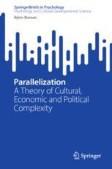Search
Search Results
-
What Makes a Good Theory, and How Do We Make a Theory Good?
I present an ontology of criteria for evaluating theory to answer the titular question from the perspective of a scientist practitioner. Set inside a...

-
From the Jones-Plug to the Amphora: Could Stemmer´s Theory of Language Acquisition Complement Skinner´s Theory of Listener Behavior?
Stemmer’s theory of language acquisition is an empiricist account of listener behavior learning based on ostensive processes similar to Pavlovian...
-
Civilization Theory and Structural-genetic Theory Programme
The Civilization theory of N. Elias combines the scrutiny of psychogenetic and sociogenetic developments sha** history from ancient to modern...
-
Theory Background
The scientific basis of the investigation are the Double Bind Theory, the Attachment Theory, the model of the double regulation of action in...
-
Parallelization Theory
This chapter examines the theoretical underpinnings of parallelization theory, its backdrop, and current development. While much of the theory rests...
-
Validation of the Five Facet Mindfulness Questionnaire-Bangla Using Classical Test Theory and Item Response Theory
ObjectivesMindfulness-based interventions are common in contemporary mental health practices. Hence, the assessment of mindfulness is necessary...

-
Understanding preservice teachers’ intentions to enact autonomy support: The combined perspectives from self-determination theory and mindset theory
This exploratory study seeks to yield a more complete understanding of preservice teachers’ intentions to enact autonomy support in their future...

-
Assessing Somatic Symptom Scale-8 (SSS-8) in Chinese youth and adolescents: using Classical Test Theory and Rasch Measurement Theory
Evaluating the increasing somatic symptoms in adolescents and youth is essential in epidemiological surveillance. This study aims to investigate the...

-
Plausibility and Early Theory in Linguistics and Cognitive Science
Various notions of plausibility are used in cognitive science to argue for or against the “goodness of theories.” However, plausibility remains...

-
Inevitable or Preventable? The Biosocial Theory of Wartime Rape
Sexual violence has likely been a feature of warfare throughout human history and may even have been present during prehistoric conflicts. In recent...
-
Theory of Mind and Social Informant Discrepancy in Autism
When autistic youth are asked to assess their own social skills, they frequently rate themselves more favorably than their parents rate them. The...

-
On the Identifiability of 3- and 4-Parameter Item Response Theory Models From the Perspective of Knowledge Space Theory
The present work aims at showing that the identification problems (here meant as both issues of empirical indistinguishability and unidentifiability)...

-
Social Learning Theory
Social learning theory utilizes precise descriptions of dyadic relationships and other larger systems dynamics that are present in families with...
-
Develo** a Choice Theory-based Family Resilience Intervention Program
This study aims to determine the impact of an online family resilience program based on the choice theory. Data collection was conducted using the...

-
Ecological Theory
The ecological theoretical perspective most often is utilized to highlight various levels of environmental context (microsystems, mesosystems,...
-
Attachment Theory
Attachment theory offers much substance to scholars interested in the study of families with adolescents. Developed out of a more psychological...
-
Classroom transmission processes between teacher support, interest value and negative affect: An investigation guided by situated expectancy-value theory and control-value theory
Are motivated students less likely to express negative achievement emotions in math, and how do teachers impact such academic beliefs? Guided by the...

-
Increasing Toy Engagement via Response Disequilibrium Theory: A Systematic Replication
Response disequilibrium theory suggests that a response deficit in a contingent activity (e.g., iPad time) can increase engagement in an instrumental...

-
The QBIT Theory: Consciousness and the Maximum Possible Order
According to the QBIT theory, the necessary and sufficient condition for the emergence of consciousness is the transformation of a system consisting...

-
Values as Motives: Implications for theory, methods, and practice
The concept of human values is central to the study of culture, ethics, politics, anthropology, sociology, social psychology, environmental studies,...

